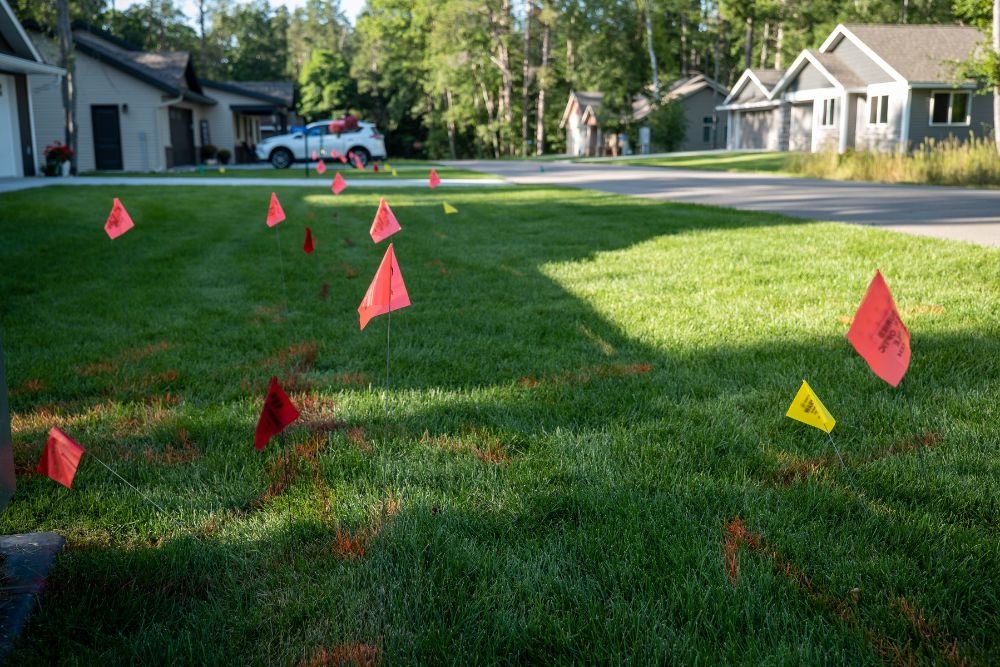
Planning a project that involves digging? Whether it’s for a new patio or just planting some shrubs, it's crucial to remember one vital step: call before you dig! Underground lines like electrical cables are often hidden from view and can be seriously damaged if struck.
By taking a few moments to contact your local utility company, you can have these lines marked before you begin digging. This simple action can prevent costly damage, potential injuries, and even save lives. Remember, it's always better to be safe than sorry.
- Before you start digging, always call at the designated number.
- Let them know what you're doing.
- Get the "all clear" signal
Before You Dig, Think Safety First
Before you start any digging project, remember safety comes first. Hidden wires and pipes underground can cause serious harm if struck. To prevent injury and potential disruption, always contact your local utility companies at least two weeks before starting your work. They will flag any buried lines so you can work with confidence.
- Remember
- Calling
- Utilities
Stay Safe, Dig Smart: Contact 811 First
Before you break ground for any project, whether it's, remember to call your local utility locating service. This simple step can minimize serious damage to vital utilities buried beneath the surface. Digging without knowing what's below can lead to hazardous situations, putting your workers at risk.
- Every time| call 811 before you dig, even for small tasks like planting a tree or installing a fence.
- Certified locator will mark the precise location underground lines to prevent damage.
- Exercise caution and make that call before you dig.
Concealed Utilities, Secret Dangers: Always Call Before You Excavate
Before you swing that shovel or dig into your yard, remember the unseen world beneath your feet. Underground utilities like gas lines, water pipes, and electrical cables are vital to our daily lives, but they also pose a serious danger if disturbed. A simple misstep during excavation can result in injury, property damage, and costly repairs. To ensure your safety and avoid these potentially catastrophic situations, always call your local utility locating service before you dig. This free service will identify the location of buried utilities in your area, allowing you to dig safely and responsibly.
- Reach out your utility companies directly for information about their specific requirements and procedures.
- Plan your excavation thoughtfully to avoid high-risk areas like near sidewalks, driveways, and trees.
- Use caution when operating heavy machinery near potential utility lines. Always keep a safe distance.
Remember, calling before you dig is not just a suggestion – it's the law in most areas. By taking this simple step, you can help protect yourself, your property, and the vital infrastructure that keeps our communities functioning.
One Call Can Save Lives and Property: Dig Safely, Call Before You Go
Before you dig into the ground for any job, remember one simple rule: reach out before you start.
It's easy to overlook underground lines but they can cause serious injury.
A single phone call to the designated utility provider can locate these vital infrastructures and avoid potentially tragic incidents.
Your security and the protection of valuable property utilize on a simple step. Make that call today and dig safely.
Call Before You Dig is Essential
Planning a new garden? Setting up a fence? Even simple tasks like planting trees can present hidden dangers if you're unaware of underground utilities. That's where calling before you dig comes in! That's a free service that connects you with local utility companies so they can mark the spot of their lines and prevent accidental damage. By taking this simple step, you preserve yourself, your property, and the essential infrastructure that keeps our communities running Fort Lauderdale property value estimation smoothly.
- Always call before you dig, even for small projects.
- Pinpoint utility lines at least two days before digging.
- Keep in mind that buried utilities may consist of gas, water, electric, and communication lines.